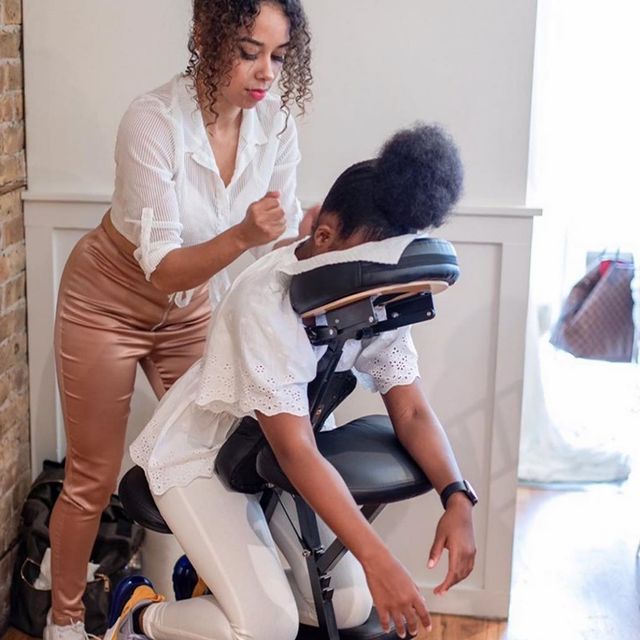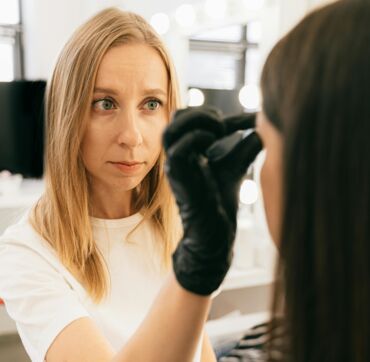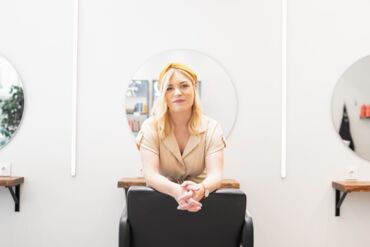Working with Clients Struggling with Mental Health Concerns

On a daily basis, beauty and wellness professionals are exposed to clients who are struggling with their mental health. Staying up to date with signs of mental health concerns is absolutely necessary for industry experts. And that's because beauty professionals are a front line of defense when it comes to helping people during a tough time.
May is Mental Health Awareness Month and to make sure that Booksy business owners have the skill sets to work with clients who are having trouble with their mental health, we spoke with a wellness professional with experience in dealing with this delicate matter.
Samantha Harris began her career in health care as a certified medical assistant. Overall, she spent almost 13 years working with doctors and nurses to save lives. But today, she is a licensed massage therapist. She devotes her time and energy into the mental health and well being of her clients. And for Sam, this route is just as rewarding as treating physical illnesses.
Take a moment to learn a few ways to identify clients who may be struggling with their mental health and battling their own demons. And find out how one wellness professional helps both newcomers and loyal customers get back on their feet, while staying balanced herself.
Keep in mind that in honor of Mental Health Awareness Month, we will also be publishing additional content on this important topic. Our continued goal is to give industry professionals the tools they need to keep clients looking their best. But we also want to make sure that industry professionals have the tools to help others feel their absolute best.
Helping Clients with Mental Health Concerns
As the owner and operator of her own small business that’s dedicated to promoting well being, Sam spends her days helping people overcome tough mental and emotional issues. And those issues can have a profound effect on people of all ages and social backgrounds.
Sam runs Sam Jeanie, a mobile recovery and relaxation clinic. She specializes in Swedish and deep tissue massages, in addition to lymphatic drainage and stretching. But most importantly, she helps people who are struggling with their mental health.
For Sam, the most important part of her job is the healing aspect that alternative medicine provides. As someone who worked as a medical professional for over a decade, she was attracted to massage therapy because of its ability to help people with mental issues, especially since some individuals shy away from working with doctors, pharmacists, and mental therapists.
“I’m helping people by giving them massages, which decreases depression and anxiety significantly. Just a massage itself is helpful. I always bring music and make sure the space is comfortable. And I do make people aware that they need this every week—I stress the importance of getting better. Sometimes all people need to do is relax,” she said.
Sam encourages beauty and grooming professionals, who see a host of different clients suffering from a range of mental health concerns, to find a wellness expert and recommend that professional to any client struggling with their mental and emotional health.
Most licensed massage therapists have a variety of therapeutic, relaxation treatments that can help with decreasing anxiety and depression, she said. Sam added that massage therapy can lower blood pressure, boost the immune system, and relieve tension. All of these benefits can be valuable tools for a client having trouble with their mental health.
Recognizing Signs of Mental Health Concerns
While Sam admittedly feels that beauty professionals are in a great position to recommend wellness experts to help their clients overcome some mental health concerns, she also states that it’s important to be knowledgeable on the subject of mental health, in order to be able to apply a number of different methods to best help every client.
Anxiety disorders are the most common mental illness in the U.S., affecting 40 million adults in the United States age 18 and older, or 18.1% of the population every year, according to the Anxiety & Depression Association of America. And about 16.2 million American adults suffer from at least one major depressive episode every year. This represents 6.7 percent of the U.S. adult population, according to the National Institute of Mental Health.
This means that it’s important to help customers in any seemingly small way, which actually does a great deal for the person sitting in your chair, said Sam. For starters, she recommends assessing every situation, regardless of whether it's a new client or a loyal customer.
More specifically, she suggests that beauty and wellness professionals get in the habit of consciously looking for signs of mental health concerns, especially depression and anxiety, because they’re so common. In regards to recognizing the signs of mental health concerns, watch out for some of the following symptoms:
- Persistent sadness or nervousness
- Irritability “empty” mood
- Loss of energy, persistent fatigue
- Frequent statements about being tired all the time
- Statements about appetite changes
- Difficulty concentrating, remembering, or making decisions
- Decreased productivity
- Complaints of unexplained aches and pains
- Alcohol abuse
Additional Ways to Help Clients
In the course of her career, Sam said that most beauty and wellness professionals recognize that part of their role as service providers is to treat everyone “like royalty.” But what that means for her is to treat people fighting their own inner demons with the utmost respect and patience.
At times she recognizes that clients won’t want to talk. So, she gives them a silent space to unwind and feel more relaxed. Other times, she lets clients vent. And that's because Sam understands that the people in her chair look to her for therapeutic support. Sometimes that simply means listening and really hearing people out, she said.
“So, I always let them talk and let them know that I’m there to listen. But it’s important not to judge. I always try to keep my opinion to myself while suggesting little extras like a hand massage or a hot towel. Adding little touches during a service can go a long way,” she said.
When Sam isn’t with clients, she takes classes on mental health awareness and recommends that other beauty and wellness professionals do the same. “I think every beauty and wellness professional should take continuing education classes to help with that. It’s all about making your experience the best. People come to you because that’s their time to wind down,” she said.
Mitigating Mental Health Concerns
Working in the beauty and wellness industry can also have a significant impact on the mental health of the stylist, barber, nail tech, or wellness provider. And that’s especially true because industry professionals regularly deal with clients who are struggling with mental health concerns.
Being there for clients means putting yourself at risk sometimes, said Sam. A number of beauty professionals are also dealing with additional stressors caused by the COVID-19 pandemic. Over the past year, Sam learned how important it is to use healthy distractions while opening up to others to remain in a positive, balanced state.
In particular, Sam likes working out three times a week. She also likes reading books, going to the beach, and simply turning her phone off for hours. All of these steps help her separate herself from her work. And these activities give Sam a much needed break, which in turn lets her be there for others.
“I also have a therapist who is helpful whenever I have a stressful week. We see each other two times a month—we do Zoom calls for about an hour. And it’s a big help. I think therapy plays a big role in our industry. A lot of clients transfer their energy onto service providers. Sometimes we might not understand it at first. But it really helps for us to be able to talk to someone too,” she said.















